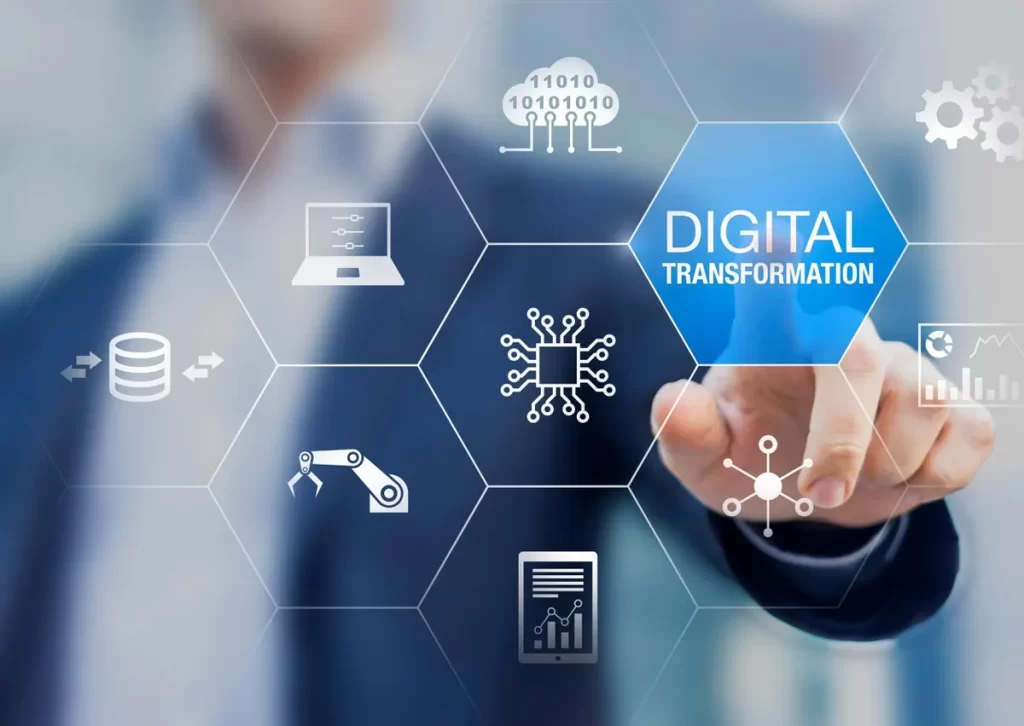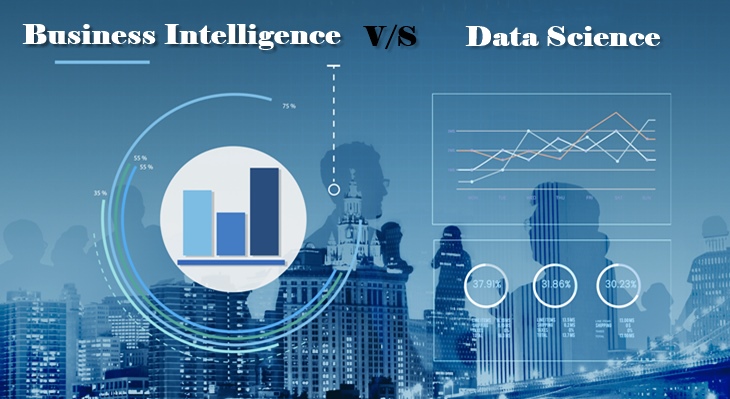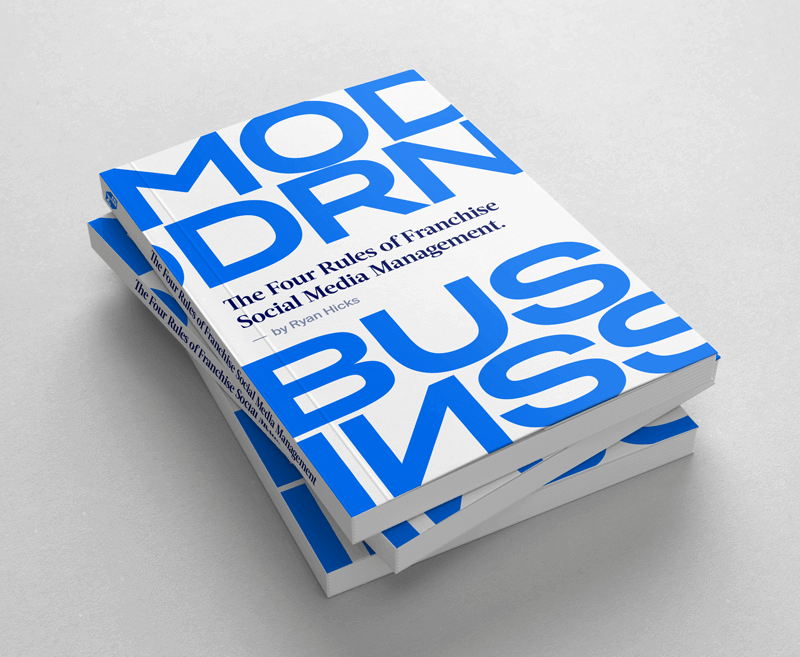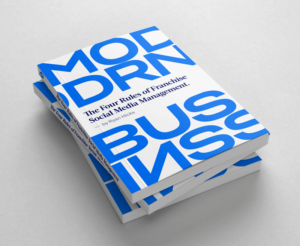In today’s rapidly evolving digital landscape, the impact of technology on modern business is undeniable. The advent of innovative technologies has revolutionized the way companies operate, interact with customers, and remain competitive. In this comprehensive blog post, we will explore the profound influence of technology on modern business, focusing on key trends and innovations that are shaping the corporate world. Modern businesses are facing a constantly changing environment, driven by technological advancements.
Technology has become the cornerstone of success, enabling companies to streamline operations, enhance customer experiences, and gain a competitive edge. In this article, we will delve into the various facets of technology’s influence on modern business, with a specific focus on Modern Business. Businessman using mobile smartphone and icon network connection data with growth graph customer, digital marketing, banking and payment online, analysis and planning of business.

1. Digital Transformation
In the dynamic landscape of business startups, digital transformation stands out as a pivotal force driving growth and innovation. This fundamental shift is propelled by technology, reshaping the way fledgling companies operate and compete in today’s market. Business startups are no longer tethered to traditional methods but wholeheartedly embrace digital tools and strategies to optimize their processes and secure a competitive edge. One of the key aspects of this transformation involves automating workflows, streamlining operations, and reducing manual tasks through the integration of cutting-edge technologies.
The adoption of cloud computing has become indispensable for startups, allowing them to scale rapidly, enhance flexibility, and reduce infrastructure costs. Additionally, startups are harnessing the power of data analytics to gain invaluable insights into customer behavior, market trends, and operational efficiency, enabling data-driven decision-making and a more agile approach to business strategy. In this era of digital transformation, business startups are not just surviving; they are thriving, thanks to their ability to leverage technology to increase efficiency, productivity, and ultimately, their chances of success in the competitive business landscape.
Modern Business and Digital Transformation
In the context of modern business, digital transformation has emerged as a strategic imperative, serving as the cornerstone of success for organizations aiming to remain relevant and competitive. In an era characterized by rapid technological advancements and shifting consumer preferences, modern businesses that do not proactively embrace digital transformation risk finding themselves trailing in the wake of their more agile and tech-savvy competitors. Digital transformation encompasses a comprehensive overhaul of how modern businesses operate.
It extends far beyond the mere adoption of technology; it represents a fundamental shift in organizational culture, processes, and strategies. Modern businesses that prioritize digital transformation are better equipped to streamline their operations, resulting in improved efficiency and productivity. By automating routine tasks and optimizing workflows, they can allocate resources more judiciously, ultimately reducing operational costs and increasing their profitability.
One of the paramount advantages of digital transformation in modern business lies in its ability to enhance adaptability. In a marketplace where change is the only constant, businesses that have undergone digital transformation possess the agility necessary to respond to evolving market dynamics and customer expectations swiftly. Whether it’s adjusting product offerings, expanding into new markets, or fine-tuning marketing strategies, these businesses are well-prepared to meet the ever-changing demands of the market.
In summary, in the context of modern business, digital transformation is not merely a choice; it is a strategic necessity. It empowers organizations to stay ahead of the curve, remain competitive, and thrive in an environment characterized by relentless change and innovation. By embracing digital solutions, modern businesses can reposition themselves as leaders in their industries, ensuring sustained growth and success in an increasingly digital-centric world.

2. E-commerce Revolution
The ascendancy of e-commerce stands as a seminal technological innovation that has left an indelible mark on modern business operations. The term “modern business” is intrinsically linked with the transformative power of e-commerce, as it signifies a profound shift from traditional brick-and-mortar setups to dynamic and digitally-driven enterprises. This revolution has unfolded as a game-changer, not only redefining how businesses engage with customers but also reshaping the very essence of commerce itself.
At the core of this transformation is the convenience online shopping offers. Modern businesses, irrespective of their size or niche, now possess the capability to transcend geographical boundaries and access a global audience around the clock. With e-commerce platforms, they can present their products and services to customers 24/7, creating a shopping experience that is tailored to the modern consumer’s desire for flexibility and accessibility.
Furthermore, e-commerce has engendered a paradigm shift in how businesses approach their operations and customer interactions. It has catalyzed the integration of cutting-edge technology into every facet of modern business. From inventory management and order processing to personalized marketing and data analytics, e-commerce has opened up a world of possibilities for enhancing efficiency and customer engagement. Modern businesses that harness the potential of e-commerce are better positioned to adapt to the rapidly changing market dynamics and customer preferences. They can pivot swiftly, experiment with new strategies, and tap into real-time data insights to optimize their offerings.
In essence, e-commerce has become the lifeblood of modern business, enabling companies to not only survive but thrive in the digital age. In conclusion, the e-commerce revolution has not just altered the way we shop; it has fundamentally reshaped the landscape of modern business. It has endowed businesses with the tools and opportunities to redefine their strategies, expand their reach, and create more personalized and responsive customer experiences. In the grand narrative of modern business, e-commerce is an integral and transformative chapter that continues to evolve and drive innovation in the ever-expanding digital marketplace.
Modern Business and E-commerce
E-commerce has ushered in a profound transformation of the modern business landscape. It has not merely introduced a new sales channel but has fundamentally redefined the very essence of what constitutes a modern business. Within this paradigm shift, the keyword “modern business” encapsulates the core attributes of agility and adaptability that are imperative for success in the dynamic digital marketplace. Companies, regardless of their size or industry, are making strategic investments to align with this new reality.
Central to these investments are user-friendly websites that serve as digital storefronts, providing customers with seamless and intuitive browsing and shopping experiences. These websites have become the frontline interfaces of modern businesses, where first impressions can make or break customer relationships. Secure payment gateways are another integral aspect of modern business, especially in the e-commerce context. They ensure the safety of financial transactions, building trust among customers. In an era marked by heightened concerns about online security, modern businesses prioritize robust security measures to safeguard sensitive customer information.
Personalization has emerged as a cornerstone of modern business strategies. E-commerce platforms utilize data analytics and artificial intelligence to understand customer preferences and behavior, tailoring product recommendations and marketing messages accordingly. This personalized approach not only enhances customer engagement but also drives conversions and fosters brand loyalty. Furthermore, the concept of “modern business” signifies adaptability to changing market dynamics and customer expectations. E-commerce equips businesses with the tools to pivot swiftly, experiment with new sales and marketing strategies, and respond to real-time data insights. In a landscape characterized by rapid evolution, the ability to stay nimble and responsive is a defining trait of modern businesses.

3. Artificial Intelligence (AI) and Machine Learning
In the ever-evolving landscape of modern business, the integration of Artificial Intelligence (AI) and Machine Learning (ML) represents a seismic shift in how organizations operate and thrive. The keyword “modern business” is intrinsically tied to the adoption of these cutting-edge technologies, which have become instrumental in reshaping the way businesses make decisions, engage with customers, and maintain their competitive edge. At the heart of AI and ML’s transformative power lies their capacity to provide data-driven insights. Modern businesses are no longer making critical decisions based on intuition alone; they are leveraging AI-driven analytics to extract actionable intelligence from vast and complex datasets.
This data-driven approach enhances strategic planning, allowing companies to anticipate market trends, customer preferences, and potential risks with unparalleled accuracy. Personalization is another hallmark of AI and ML’s impact on modern business. These technologies enable businesses to tailor products, services, and marketing campaigns to the unique preferences and behaviors of individual customers. By analyzing vast troves of customer data, modern businesses can deliver personalized recommendations, ultimately improving customer satisfaction, loyalty, and overall engagement.
Perhaps one of the most significant advantages of AI and ML is their role in automating routine tasks and processes. Modern businesses are deploying these technologies to handle everything from customer inquiries and data entry to supply chain management and quality control. This automation not only reduces operational costs but also frees up human resources for more strategic and value-added tasks. Moreover, AI and ML are driving advancements in customer service, offering chatbots and virtual assistants that provide instant and efficient customer support.
This not only enhances the customer experience but also ensures that businesses can provide round-the-clock assistance, a hallmark of modern business operations. AI and ML have emerged as indispensable tools in the arsenal of modern businesses. Their ability to generate data-driven insights, deliver personalized experiences, and automate routine tasks empowers companies to remain competitive and innovative in a rapidly changing business landscape. In the context of modern business, AI and ML are not just technologies; they are catalysts for growth, efficiency, and customer-centricity.
Modern Business and AI
Integrating Artificial Intelligence (AI) into modern business practices has transcended being a mere option; it has become an essential imperative for staying relevant and competitive. In the dynamic landscape of “modern business,” AI is at the very heart of innovation and operational efficiency, reshaping how companies operate and interact with their customers. A prime example of AI’s transformative role in modern business is the deployment of chatbots and virtual assistants. These AI-powered tools provide instant customer support, enhancing responsiveness and availability. Modern businesses can engage with customers around the clock, promptly addressing queries and concerns.
This not only improves customer satisfaction but also streamlines internal processes by reducing the workload on human customer support teams. Predictive analytics, another critical facet of AI, plays a pivotal role in optimizing supply chains and inventory management. Modern businesses are leveraging AI algorithms to analyze historical and real-time data, enabling them to make informed decisions about demand forecasting, inventory levels, and distribution strategies. The result is not only cost savings but also improved customer experiences through faster deliveries and reduced stockouts.
Furthermore, AI empowers modern businesses to deliver highly tailored and personalized experiences to their clientele. Through sophisticated data analysis, AI systems can understand individual customer preferences, behavior patterns, and purchase histories. Armed with these insights, businesses can craft personalized marketing campaigns, product recommendations, and user experiences that resonate with each customer, thereby enhancing customer loyalty and engagement.
In essence, in the context of “modern business,” AI is more than just a technological tool; it is the cornerstone of innovation, efficiency, and customer-centricity. Embracing AI is not merely a strategic advantage; it is an essential element for businesses aiming to thrive in today’s competitive landscape. By incorporating AI into their operations, modern businesses can operate more efficiently, make data-driven decisions, and deliver tailor-made experiences that set them apart from the competition, ultimately ensuring their relevance and longevity.

4. Data Analytics and Business Intelligence
In the digital era, data has earned the moniker of “the new oil” for good reason. Modern businesses are constantly accumulating vast reservoirs of data from various sources, and the ability to harness and analyze this data has become a linchpin of success in the contemporary business landscape. Within the context of “modern business,” data analytics and business intelligence (BI) emerge as pivotal tools that empower companies to extract actionable insights from their data, shaping informed decision-making and competitive advantage. The volume and diversity of data generated by modern business operations are staggering. From customer interactions and sales transactions to website activity and operational metrics, data is generated at an unprecedented scale.
Data analytics tools, ranging from machine learning algorithms to sophisticated data mining techniques, enable modern businesses to make sense of this data deluge. By sifting through this information, companies can unearth valuable insights, identifying trends, patterns, and correlations that might have otherwise remained hidden. Business intelligence solutions complement the data analytics landscape by providing a structured framework for data visualization, reporting, and dashboarding. These tools enable decision-makers within modern businesses to access critical information in real-time, facilitating quicker and more informed decision-making. Whether it’s tracking key performance indicators (KPIs) or monitoring operational efficiency, BI solutions offer a holistic view of the business’s health.
The synergy between data analytics and BI is central to the concept of “modern business.” It enables companies to optimize their strategies, refine their customer experiences, and streamline their operations. For instance, data-driven insights can inform marketing campaigns, leading to more effective customer targeting and personalized messaging. Likewise, data analytics can enhance supply chain management, helping modern businesses adapt to changing demand patterns and reduce costs. In conclusion, in the contemporary business landscape, data analytics and business intelligence have become indispensable for modern businesses.
They are the tools that enable companies to leverage the wealth of data they generate, transforming it into a strategic asset that fuels growth and innovation. In the quest for competitiveness and sustainability, modern businesses recognize that data-driven decision-making is not just an advantage but a necessity, and the fusion of data analytics and business intelligence forms the bedrock of this transformation.
Modern Business and Data Analytics
In the realm of modern business, data analytics and business intelligence (BI) have risen to prominence as indispensable pillars of success. The keyword “Modern Business” embodies the concept of leveraging data-driven insights to drive informed decision-making, enhance products and services, and stay at the forefront of emerging market trends. Data analytics empowers modern businesses to transform raw data into actionable knowledge. By applying advanced algorithms and statistical techniques, companies can sift through vast volumes of data to discern patterns, trends, and correlations.
These insights serve as a compass for strategic decision-making, enabling businesses to make informed choices about everything from product development to marketing strategies. Moreover, business intelligence solutions offer a structured framework for organizing and presenting data in an easily digestible format. Through intuitive dashboards and reports, decision-makers in modern business environments gain real-time access to key performance indicators and critical business metrics. This accessibility fosters a culture of data-driven decision-making, enabling quick responses to changing market conditions.
One of the hallmarks of modern business is its ability to harness data to optimize products and services. By analyzing customer feedback, behavior, and preferences, companies can fine-tune their offerings, enhancing the overall customer experience. Whether it’s refining user interfaces for digital platforms or tailoring marketing campaigns to specific demographics, data analytics and BI support businesses in delivering products and services that align more closely with customer expectations. Furthermore, modern businesses recognize the value of staying ahead of the curve when it comes to emerging market trends.
Data analytics not only identifies these trends but also provides the insights necessary to capitalize on them. By proactively adapting strategies based on data-driven insights, businesses can maintain their relevance and competitive edge. In summary, data analytics and business intelligence are indispensable tools for modern businesses. They epitomize the ability to harness the wealth of data available in the digital age to drive informed decisions, enhance products and services, and navigate the ever-evolving business landscape. In the context of “modern business,” these technologies are not just assets; they are strategic imperatives that enable companies to thrive in an era where data is the currency of success.

5. Cybersecurity and Data Protection
In the landscape of modern business, the importance of cybersecurity and data protection has ascended to paramount significance. The keyword “Modern Business” encompasses the imperative need for safeguarding sensitive customer information, proprietary data, and intellectual property from the ever-evolving landscape of cyber threats. As businesses have become increasingly reliant on technology, the specter of cyberattacks looms larger than ever before, making robust cybersecurity measures not just a choice but an existential necessity. Modern businesses are custodians of vast volumes of sensitive data, including customer records, financial information, and proprietary research.
The digital age has introduced unparalleled conveniences, but it has also opened doors to malicious actors seeking to exploit vulnerabilities. Cyberattacks, ranging from ransomware to phishing scams, have the potential to disrupt operations, tarnish reputations, and inflict substantial financial losses. Hence, cybersecurity is no longer an auxiliary concern; it is a core tenet of modern business strategy.
To safeguard against cyber threats, modern businesses deploy a multifaceted approach. This encompasses proactive measures like encryption, access controls, and regular security audits to fortify digital fortresses. Furthermore, employee training and awareness programs are integral components, as human error remains a prominent entry point for cyberattacks. Cybersecurity technologies like intrusion detection systems and firewalls serve as vigilant gatekeepers, defending against unauthorized access and data breaches.
Data protection, a critical facet of cybersecurity, dovetails with modern business’s responsibility to maintain the integrity and confidentiality of sensitive information. This extends to customer data and safeguarding proprietary algorithms, intellectual property, and strategic plans. Compliance with data protection regulations, such as GDPR and HIPAA, is non-negotiable in the modern business landscape, with penalties for breaches being substantial.
Modern Business and Cybersecurity
In the dynamic landscape of modern business, maintaining a robust cybersecurity posture has transcended being a discretionary consideration—it has become an indisputable necessity. Companies that bear the badge of “modern business” are acutely aware that prioritizing cybersecurity is not just a choice; it is a fundamental commitment to safeguarding customer trust, preserving their own reputation, and ensuring business continuity in an increasingly digital world.
The digital transformation that characterizes modern business has undeniably brought about numerous benefits, but it has also exposed organizations to an array of cyber threats that are more sophisticated and prevalent than ever before. As custodians of sensitive customer information, financial data, and intellectual property, modern businesses recognize that cyberattacks not only jeopardize their own operations but also the trust and privacy of their customers.
The essence of modern business lies in its ability to harness technology to streamline operations, enhance customer experiences, and drive innovation. However, this technological reliance is a double-edged sword, as it presents a wider attack surface for cybercriminals. To counter these threats, modern businesses are proactive in deploying comprehensive cybersecurity measures, including firewalls, intrusion detection systems, encryption protocols, and regular security audits.
Moreover, employee education and awareness programs are pivotal in modern business’s cybersecurity strategy. Human error remains a common vector for cyberattacks, so cultivating a culture of cyber hygiene and vigilance is paramount. Employees are trained to identify phishing attempts, practice secure password management, and report suspicious activity promptly.

6. Remote Work and Collaboration Tools
In the landscape of modern business, the integration of technology to enable remote work environments has emerged as a transformative trend. This shift has empowered employees to work from virtually anywhere in the world, underscoring the keyword “modern business” as a testament to adaptability and connectivity. Today, modern businesses recognize that the traditional nine-to-five office model is no longer the sole paradigm of productivity; instead, the ability to embrace remote work and harness collaboration tools has become an imperative for success. The advent of remote work has been made possible through the proliferation of advanced collaboration tools and digital platforms.
Modern businesses have transitioned from physical office spaces to cloud-based ecosystems, where teams can seamlessly connect and collaborate irrespective of geographical distances. Video conferencing, project management software, instant messaging platforms, and document-sharing tools are just a few examples of the technology-driven solutions that have become integral to modern business operations.
The benefits of remote work and collaboration tools are manifold. They allow businesses to tap into a global talent pool, fostering diversity and expertise that transcends borders. Furthermore, remote work enhances employee flexibility, enabling a better work-life balance, which, in turn, contributes to increased job satisfaction and productivity. It also positions businesses to navigate unexpected disruptions, such as the COVID-19 pandemic, with greater resilience.
Moreover, modern businesses have realized that remote work and collaboration tools are not just a contingency plan but a strategic advantage. They reduce overhead costs associated with physical office spaces, promote environmental sustainability by reducing the need for daily commuting, and enable businesses to scale and operate more efficiently. Additionally, they foster a culture of continuous learning and adaptability, essential for thriving in an ever-evolving business landscape.
Modern Business and Remote Work
The notion of modern business has evolved to encompass a dynamic and flexible approach that readily adapts to remote work trends. At its core, “modern business” signifies an agile and forward-thinking ethos, which involves embracing the integration of collaboration tools, video conferencing platforms, and project management software to ensure seamless communication and sustained productivity, regardless of geographical constraints. The rise of remote work as a prevalent business model has been underpinned by technological advancements that enable employees to collaborate effectively from diverse locations.
Modern businesses understand that the traditional concept of an office-bound workforce is no longer the sole pathway to success. Instead, they have harnessed digital tools to create virtual workspaces that facilitate real-time interactions, team collaborations, and the sharing of ideas, projects, and information. Collaboration tools have become central to modern business operations. They enable teams to work cohesively, transcending geographical boundaries and time zones. These tools foster a sense of connectivity and engagement among remote employees, making it possible to maintain the level of collaboration and innovation that was once associated primarily with in-person interactions.
Video conferencing platforms have taken the place of face-to-face meetings in modern business settings. They provide a platform for live discussions, presentations, and brainstorming sessions, thereby fostering clear and impactful communication. With high-definition video and audio capabilities, these platforms bridge the physical divide and enable remote teams to collaborate as effectively as if they were sitting in the same room.
Project management software has become a linchpin in modern business practices. It offers a centralized hub for organizing tasks, tracking progress, and managing projects, all while ensuring that remote teams remain aligned and focused on shared goals. This level of transparency and organization is critical for modern businesses to maintain productivity and meet deadlines in a remote work environment.
7. Conclusion
the impact of technology on modern business is nothing short of transformative and all-encompassing. From the pivotal shifts brought about by digital transformation, e-commerce, AI, data analytics, and cybersecurity, to the revolution in remote work, technology has become the cornerstone of “Modern Business.” In this rapidly evolving landscape, the ability to harness these technological innovations is not just advantageous but imperative for companies aiming not just to survive but thrive in the digital age. As the trajectory of modern business continues to evolve, staying ahead of the curve in terms of technological trends and innovations is paramount.
The keyword “Modern Business” symbolizes the adaptability, resilience, and agility required to navigate the dynamic and ever-changing corporate terrain of today. By wholeheartedly embracing technology and harnessing its transformative potential, modern businesses can unlock new horizons, foster innovation, and achieve sustainable growth in an environment where digital prowess and strategic flexibility are the keys to long-term success.




